All About Vaccinating Your New Puppy
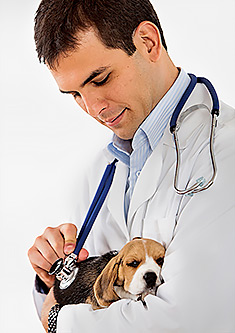
One responsibility most first time dog owners forget to take into account is the amount of veterinary care that is necessary in keeping your puppy happy and healthy! Learn the basics of finding a vet and getting puppy vaccinated.
Your First Trip to the Vet
The first trip to the vet will most likely be one of the more expensive visits of your puppy’s life. Expect a thorough checkup, worm testing, and puppy’s first shots. You may need to bring a sample of your dog’s stool for worm testing.
It is not uncommon for new puppies to be born with parasites that have been contracted from the mother. Be sure to check with your vet about what you need to bring on the first visit.
The full checkup should include the following:
- Checking the puppy’s temperature
- Listening to the heart and lungs
- Checking eyes, ears, mouth, and nose
- Feeling around the genitals for any abnormalities or disease
Vaccinations
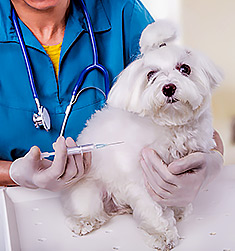
The most important booster your puppy needs within the early months of his life is known as the DHPP shot. This booster prevents Distemper, Hepatitis, Parainfluenza, and Parvovirus.
These diseases are vaccinated in one simple combination shot. This shot is often done in sets of three, each set given three to four weeks apart. Your puppy should receive his first DHPP shot at roughly 6 to 7 weeks of age.
It’s important to know what the vaccines are actually preventing and how your puppy may react to these vaccines.
-
Distemper: is a highly contagious disease of which puppies are very susceptible. It is an airborne virus that inflames the areas of your dog that are lubricated such as the eyes, nose, mouth, and genitals. Distemper usually begins as what appear to be cold symptoms in your dog. While distemper may not be incredibly common in the US, the distemper vaccine is highly encouraged by vets because of its fatal consequences in young dogs.
-
Hepatitis: is virus that attacks your puppy’s liver. There is no cure for hepatitis in dogs so it is especially important that this vaccination is given as soon as your puppy is old enough for the DHPP booster. While older dogs can ride out the virus with treatment for symptoms, death is usually the consequence for young puppies.
-
Parainfluenza: more commonly known as kennel cough, is an inflammation of the upper airways which can lead to pneumonia or chronic bronchitis if not treated. Parainfluenza is transmitted by nasal secretions, often when dogs will sniff each other or rub noses.
-
Parvovirus: is a serious and highly infectious disease that can result in death very quickly. It’s also the most common serious canine disease in the United States. Parvo causes excessive diarrhea and inflammation of the small intestine. Parvo is also very difficult to detect and dogs will often show no symptoms until it is too late.
These vaccines are all included in the one DHPP shot and should be given once every year. The shot is only distributed into three sets the very first time you immunize. Common side effects of the DHPP shot include slight fever, swelling at the injection site, loss of appetite, and lethargy.
In rare cases, as with most vaccines, it can result in anaphylactic shock and death if the puppy has an allergy to the vaccine. Risk is very low and highly encouraged by vets. It is important to vaccinate your pet if you intend to leave your puppy with a kennel or regularly socialize your puppy with other dogs. Most kennels and sitters will not accept a dog that has not been vaccinated.
Additional Special Vaccinations
The Bordetella vaccine is usually only encouraged in dogs that are often around a large number of other dogs. Show dogs are commonly vaccinated for Bordetella. This vaccine is simply another preventative measure against kennel cough.
As long as your dog is getting his yearly DHPP vaccine, it is probably not necessary to get an annual Bordetella shot since the DHPP vaccine already prevents the leading cause for kennel cough, parainfluenza. Side effects can be especially negative if your dog is vaccinated with both the DHPP and Bordetella shots annually. Do not over-vaccinate your dog.
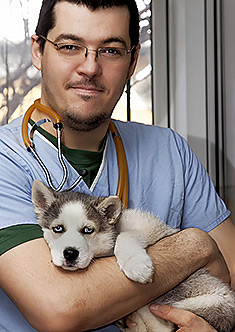
The Rabies vaccine is necessary for your puppy, but it will not be given at the first vet visit. Puppies should be at least four months old before this vaccine is given. This shot is required by law.
Each state requires rabies vaccinations every three years. Often, the first rabies vaccination your puppy receives will last only one year. It is highly encouraged that rabies vaccinations be given every year.
One of the most common side effects of the rabies vaccine is a sudden occurrence of seizures or epilepsy.
This is because the vaccine affects the nervous system. Other side effects include aggressiveness, anxiousness, fever, and vomiting. More rare side effects have resulted in cancer, autoimmune diseases, allergies, and skin problems.
Spaying and Neutering
Puppies should be spayed or neutered as soon as possible. Vets recommend around four months of age. There are many positive reasons to spay or neuter your dog aside from reproductive reasons.
Females should be spayed before their first heat. Once a female is spayed, she has close to zero percent of getting mammary gland cancer and less chance of contracting the life threatening infection, Pyometra.
Males, once neutered, are less likely to develop a number of some cancers of the testicle and prostate. Males will also become less aggressive. The procedure, while more intrusive for a female, is a low risk surgery.
The male procedure is also an even lower risk surgery. Side effects from spaying or neutering may include vomiting or disorientation from the anesthesia. Male dogs will sometimes gain a small amount of weight after being neutered.
Heartworm
Puppies should be tested for heartworms around six months of age. Heartworms are not detectable before this period because they have not had a time to mature. The worms are contracted by the bite of an infected mosquito, which transfers the infection to the blood and destroys the heart and lungs.
Even though you may not live near stagnant water or swamps, heartworms have been present in all 50 states. It is still imperative to test and treat. Testing requires a blood test and should be done annually with their DHPP booster.
Prevention is easy and inexpensive. Your vet should be able to offer a wide selection of preventative medicines that are usually in the form of a daily chewable tablet.
Your vet will often perform a preventative de-worming at your first visit. From then on, have your dog tested annually for both internal and external parasites. Flea and tick prevention is also easy and inexpensive.
Aside from the more ancient flea and tick control methods such as collars and sprays, many brands offer a gel that is applied to the nape of the neck. It will protect your dog from fleas and ticks for one month without a harsh smell or worry that it will be consumed by your dog.
You’ve decided to adopt or buy a new puppy. That’s great! A dog may be one of the most loyal companions you will ever have. They will expect you to take care of them in every aspect of their life. They expect you to feed them, play with them, discipline them and, above all, love them.
Giving your puppy the proper healthcare early on is one of the best ways to ensure their longevity and happiness. Be open and honest with your vet. Know the pros and cons of each vaccine and test. Remember to vaccinate and test your dog annually.
Related Articles
Spay and Neuter Your Dog: The Risks and The Benefits
Doggies Den: Latest Articles
 Homemade Thanksgiving Treats for Your Dog
Homemade Thanksgiving Treats for Your Dog
NUTRITION We all want to include our dogs in our holiday celebrations, but hopefully, you're aware that sharing table scraps with your dog isn't always the best idea.
 Keeping Your Dog Safe during the Summer Months
Keeping Your Dog Safe during the Summer Months
HEALTH Summer is coming on fast, so it’s time to plan how you will keep your dog safe and healthy through the lazy, carefree, warm days.
 Vaccination Time Again-Keeping Your Puppy Healthy
Vaccination Time Again-Keeping Your Puppy Healthy
DOG HEALTH So you have your new puppy picked out. There are quite a few shots, treatments and examinations that will keep the newest member of your family healthy.
 Canine Thanksgiving Feast
Canine Thanksgiving Feast
NUTRITION With the wide variety of food at Thanksgiving dinner, chances are you'll want to give your dog something special, too. If you're contemplating what to feed your dog for the holiday, here is a guide to a great Canine Thanksgiving Feast.
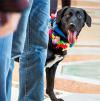 Dog Walking Tips Every Owner Should Know
Dog Walking Tips Every Owner Should Know
DOG FUN Walking your dog is not only crucial to keeping him healthy and happy, it strengthens the bond between your canine friend and his caregiver. There are a lot of obstacles out there. Don’t forget these simple tips to keep your walk fun and safe in the outside world.
 The Benefits of Physiotherapy for your Dog
The Benefits of Physiotherapy for your Dog
HEALTH The same techniques that physiotherapists use to treat a variety of injuries and conditions in humans have been adapted to suit animals with great success. Family pets, show dogs, and working dogs can all benefit greatly from physiotherapy. Dogs whose activities involve a lot of agility are especially susceptible to the types of problems that physiotherapy can address.
 The Decision- Adding a Dog to Your Family
The Decision- Adding a Dog to Your Family
FIRST TIME OWNERSBringing a dog into your family is a decision where many people don’t realize it’s magnitude until after they have the dog. There are a number of things that you need to research before you decide to purchase a dog, and it starts right in your own home.
 Bringing Your Dog Into Your New Baby's Life
Bringing Your Dog Into Your New Baby's Life
HEALTH Many believe that a dog and a new baby cannot happily coexist, so therefore the dog has to go. This is not necessarily the case.  A new baby does not mean you have to abandon your dog.

Doggies Den:
Most Popular Articles

Dog Pregnancy Symptoms
HEALTHIf you suspect your dog might be pregnant, check out part one in this series on pregnant dogs, where we cover pregnant dog symptoms.
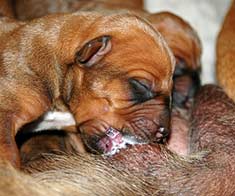
Dog Birth
HEALTHIn the third article of our dog pregnancy series, we look at the wonderful, but messy, process of bringing newborn puppies into the world.

Indoor Dog Potties
DOG PRODUCTSIt's been a long day at work. You were so busy, you didn't even take time to eat a sandwich, let alone run home to let your dog out. You're on your way home, knowing the poor dog is crossing his or her legs by now, when your car breaks down, delaying you even further. Can't somebody make this easier?
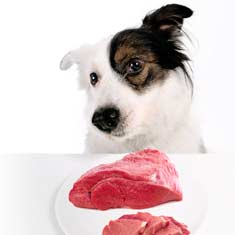
Your Dog’s Digestive System
PHYSIOLOGYEver wonder why your dog eats so fast? Or why he eats gross things? Or why he gets sick to his stomach? Or why his waste stinks so bad? Some of these things are normal, some are not.

Canine Respiratory System
BREATHINGThe basic function of your dog's respiratory system is to bring oxygen in to and remove carbon dioxide from the body. Knowing the symptoms of respiratory diseases can help you help your stay healthy.
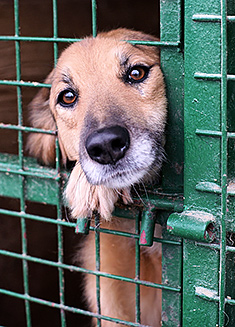
Shelter Dog Adoption Tips for Success
ADOPTION Are you intimidated by the prospect of "rescuing" a dog from a shelter? One reason that you may be wary of adopting a dog from a shelter is not knowing how to choose. Adopting a dog from a shelter can be a rewarding process, if you're prepared to do a reasonable amount of research.
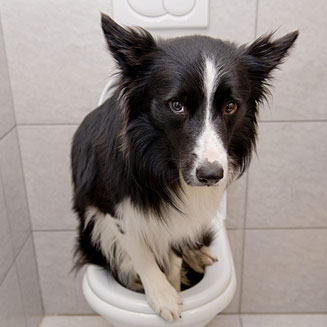
Canine Urinary Tract Infections
SYMPTOMS AND TREATMENTDoes your dog seem to be having trouble relieving his or her bladder? Learn how to recognize the signs of urinary tract infections and how to treat them before they spread.
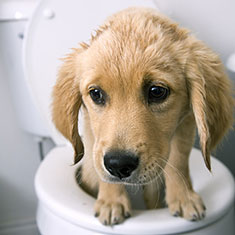
What to do for Dog Diarrhea
SYMPTOMS AND REMEDIESIf you have dogs in your house for any length of time, you have likely experienced at least one bout of dog diarrhea. Beyond the pain in the tuckus involved in cleaning up the mess, you should know what causes diarrhea, and when it's important to see the vet.

What to do for a Dog Bite
DOG BEHAVIOR Getting bitten by a dog can be scary, and you may be tempted to run around in circles for a while, trying to figure out what to do. Here's our guide to help you manage the situation.
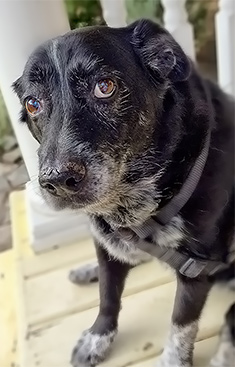
Top Ten Tips for Living with a Senior Dog
DOG HEALTH Bringing home a new puppy is so exciting, but it doesn’t take all that long for your exuberant puppy to grow into a senior dog who may have special needs. Here are the doggies.com top ten tips for taking care of your companion who has been with you through so much.
